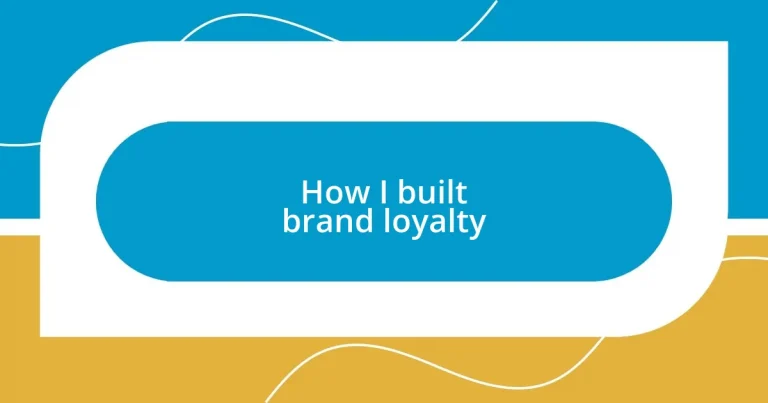Key takeaways:
- Brand loyalty is driven by emotional connections and personalized customer experiences, leading to long-term support for brands.
- Consistent brand identity and authentic storytelling resonate deeply with customers, enhancing loyalty and community feeling.
- Engaging with customers through personalized interactions and utilizing social proof builds trust and fosters a sense of belonging.
- Effective loyalty programs, including tiered rewards and personalized offers, amplify emotional connections and encourage repeat business.
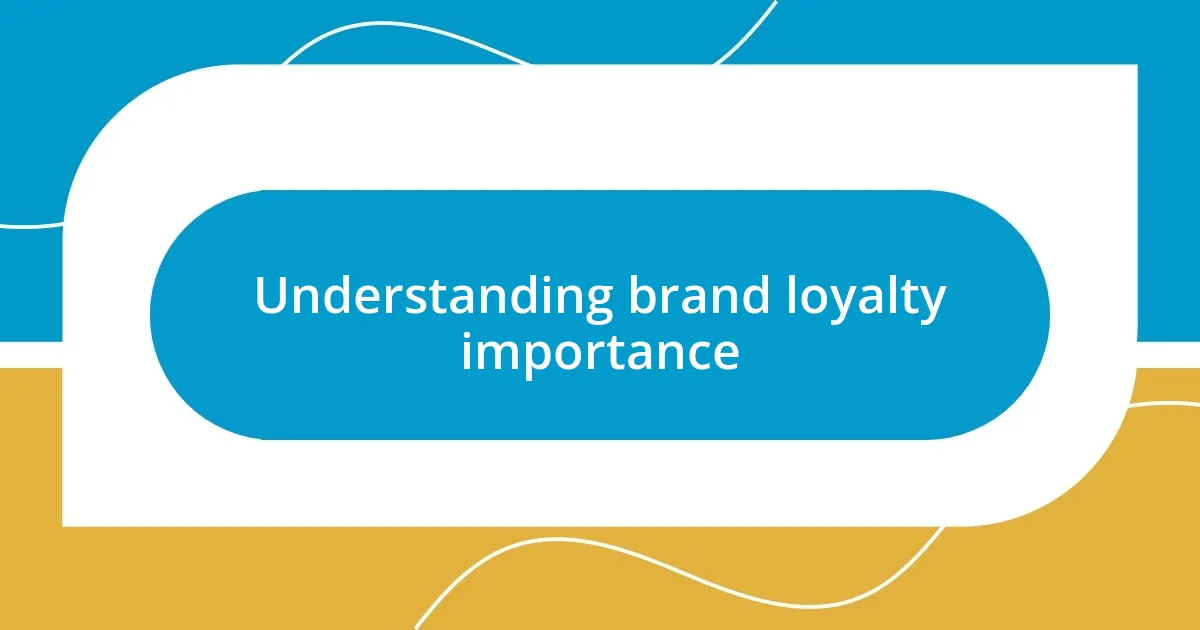
Understanding brand loyalty importance
Brand loyalty is vital for any business seeking long-term success. I’ve noticed that consumers often gravitate towards brands that resonate with their values and lifestyle. When I find a brand that truly understands me, I’m not just a customer; I’m a supporter for life. Isn’t it fascinating how a simple emotional connection can transform a one-time buyer into a loyal advocate?
Reflecting on my own experiences, I think about my favorite coffee shop. The barista knows my name and remembers my go-to order. That personal touch makes me feel valued, enhancing my loyalty to the brand. When customers feel appreciated, they’re more likely to choose that brand over others, even if it means paying a bit more. Don’t you find it amazing how small gestures can lead to profound loyalty?
Moreover, brand loyalty brings considerable benefits for businesses. It often results in repeat purchases, reducing marketing costs—since retaining a customer is typically cheaper than acquiring a new one. I often return to my favorite brands without even considering alternatives because I have built trust in them. Can you recall a brand you feel this way about? It’s this trust that not only boosts sales but also fosters a community around the brand, creating a cycle of loyalty that feeds itself.
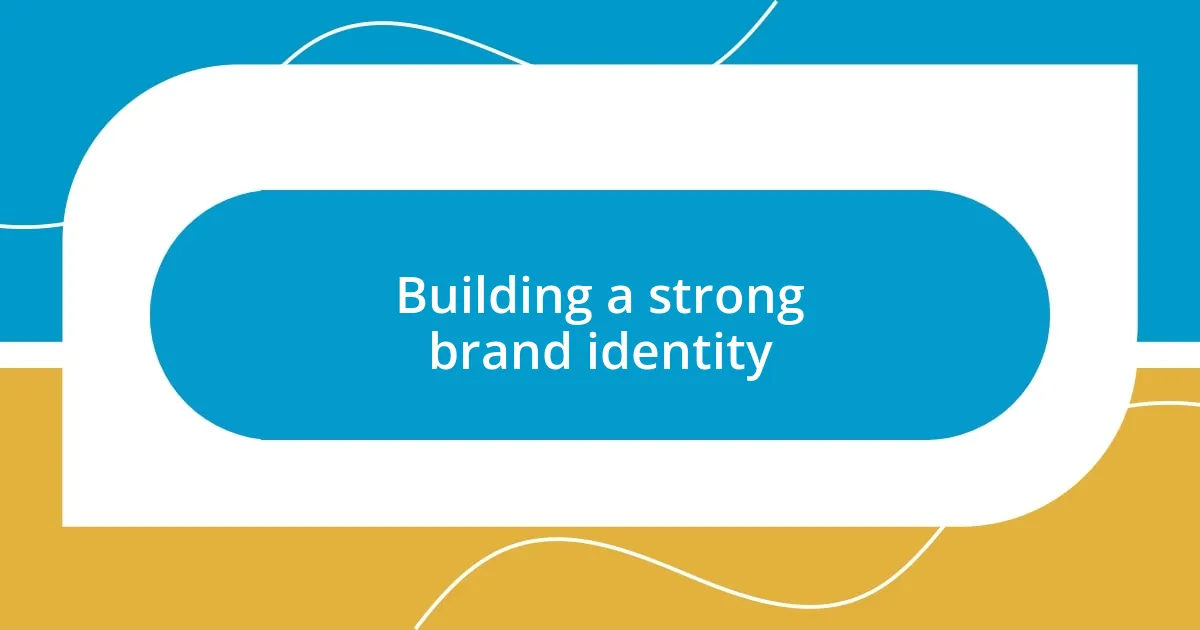
Building a strong brand identity
Creating a strong brand identity is crucial for cultivating loyalty. I remember the first time I came across a clothing brand that spoke to my values. The moment I saw their logo and the way they presented their products, I felt an instant connection. It’s about more than just aesthetics; a brand’s identity should tell a story that resonates deeply with its audience.
Over time, I’ve realized that consistency is key in building a brand identity. For example, I follow a skincare brand that stays true to its messaging of sustainability and transparency. Their packaging, marketing materials, and product formulations all reflect that core principle. This consistent approach not only reinforces their identity; it also makes me feel proud to support a brand that aligns with my values. Have you ever felt that warmth from a brand’s authenticity, where every interaction feels like a continuation of their story?
Furthermore, I can’t stress enough the role of emotional engagement in establishing a brand identity. When I discovered a local bakery that shared its origin story—a grandmother’s cherished recipes—it transformed my perspective of their offerings. Each bite now carries nostalgia and warmth. It’s remarkable how that connection elevates a simple pastry to a beloved memory. Have you come across a brand that invokes such cherished feelings for you? Building a strong brand identity often means weaving those emotional threads into your narrative.
| Aspect | Brand Identity Elements |
|---|---|
| Visuals | Logo, color palette, and design consistency |
| Messaging | Values conveyed through slogans and communications |
| Emotional Connection | Storytelling that resonates with audience experiences |
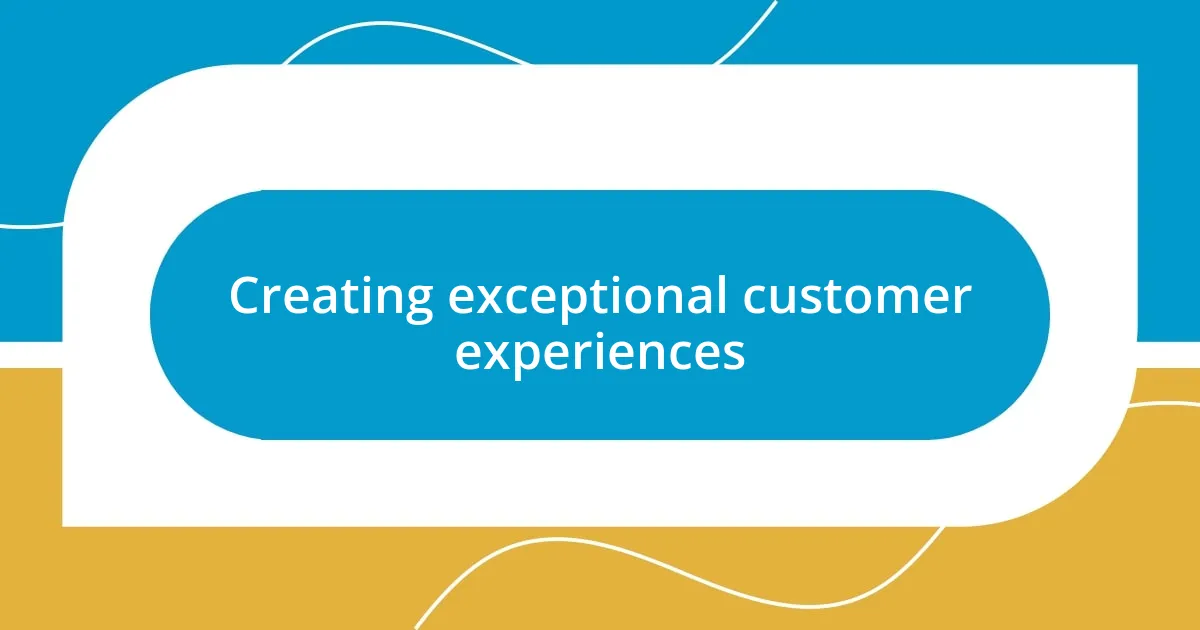
Creating exceptional customer experiences
Creating exceptional customer experiences is all about making meaningful connections that resonate with customers. I recall a time when I visited a small boutique where the owner took the time to chat with me about my style and preferences. That genuine interest made me feel seen and valued, compelling me to return not just for the products, but for that personalized experience. It’s moments like these that can elevate a simple transaction into a lasting relationship.
To ensure exceptional experiences, businesses can focus on the following areas:
- Personalization: Tailoring interactions based on customer preferences and history.
- Consistency: Delivering reliable and manageable experiences across all touchpoints.
- Accessibility: Making it easy for customers to reach out for support or feedback.
- Emotional Engagement: Crafting experiences that evoke feelings of happiness or nostalgia.
- Feedback Utilization: Actively seeking and implementing customer input to foster continuous improvement.
Every time I revisit that boutique, my heart warms at the thought of the welcoming atmosphere created by the owner. It’s those little pieces of care and attention that, in my eyes, define exceptional customer experiences and build unwavering loyalty.
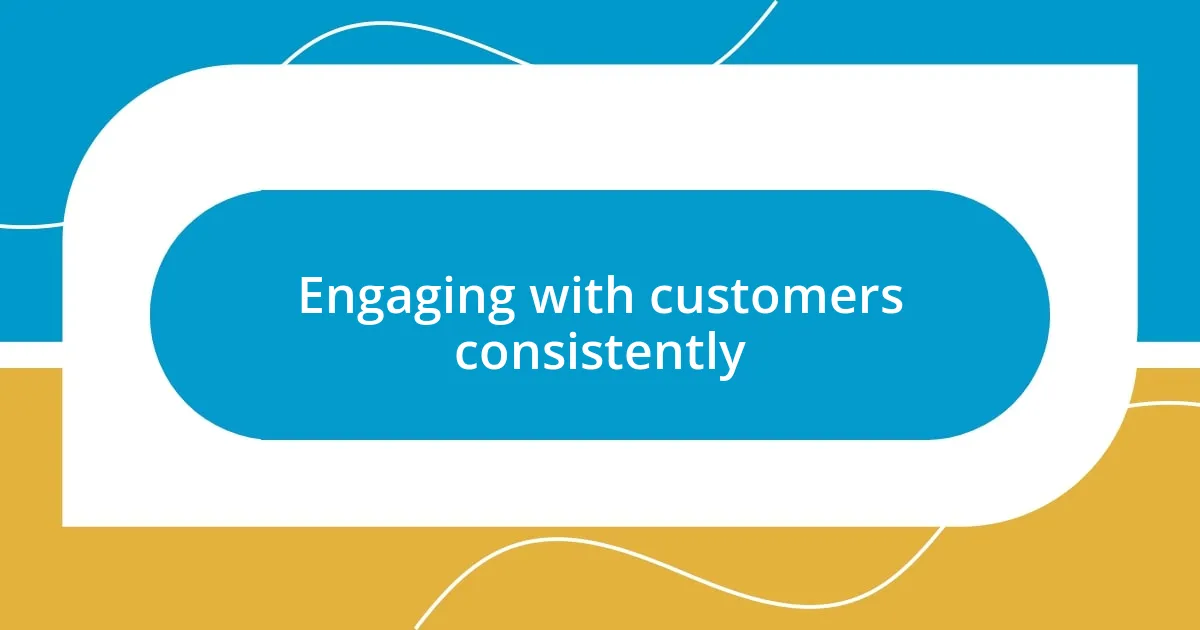
Engaging with customers consistently
Engaging with customers consistently has been a game changer for my brand loyalty journey. I recall a coffee shop I frequently visit that sends out thoughtful emails every few weeks, showcasing new seasonal drinks and sharing behind-the-scenes stories about their sourcing practices. This not only keeps me informed but also makes me feel like a part of their community. Have you ever felt a brand pulling you in like that, as if you were in on their secrets?
In my experience, regular engagement can take on many forms, from social media interactions to personalized newsletters. For instance, I follow a tech brand that responds to customer comments with genuine enthusiasm and even shares user-generated content. This transparency invites me into their world while making me feel valued as a part of their journey. Isn’t it incredible how simple interactions can build such a strong rapport?
Additionally, I’ve noticed how consistency in voice and messaging strengthens my connection with a brand. For example, there’s a travel company I’ve booked multiple trips with. Their emails feel like friendly conversations rather than marketing pitches, and I always anticipate their updates. It’s as if every communication adds another layer to our relationship. Do you have brands that make you look forward to their messages as much as you enjoy their products? That kind of connection can truly foster loyalty.
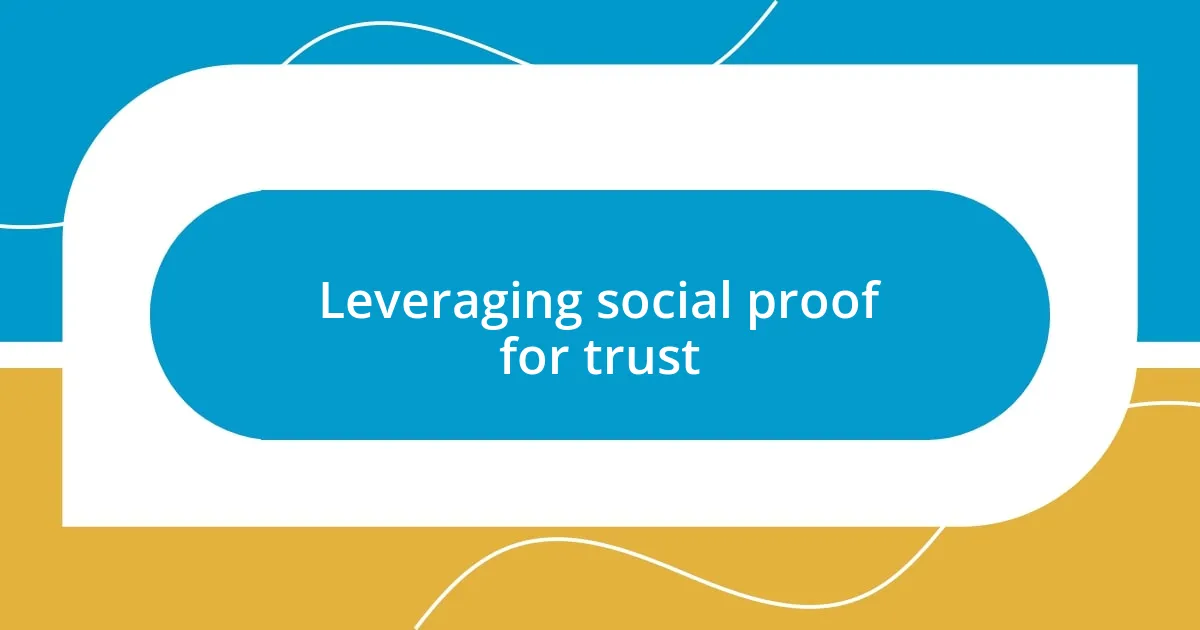
Leveraging social proof for trust
Building trust through social proof has been pivotal in my journey to foster brand loyalty. I remember the first time I chose a meal kit delivery service; it was the glowing reviews and photos from other users on social media that drew me in. Seeing real people enjoying their meals made the service feel like a reliable choice. It’s fascinating how the experiences of others can sway our decisions, isn’t it?
I often share my own experiences on platforms like Instagram, and I’ve noticed how much my followers appreciate authenticity. When I post a picture of a product I loved, people reach out, asking for my personal review. This peer validation reinforces their trust in not just my recommendation, but also in the brand itself. Have you ever found yourself relying on friends’ opinions or online testimonials before making a purchase? I certainly have, and it’s this sense of community that brands can harness to strengthen their credibility.
Another example comes to mind with a skincare line I recently tried; it was their use of customer testimonials in their marketing that really caught my eye. When I spotted before-and-after photos alongside personal stories, it felt like I wasn’t just buying a product, but joining a movement that others believed in. This shared experience creates a bond that’s hard to break, and it makes me think: how powerful is it for a brand to showcase the voices of its customers? It’s a testament to trust that can amplify loyalty in ways traditional advertising simply can’t.
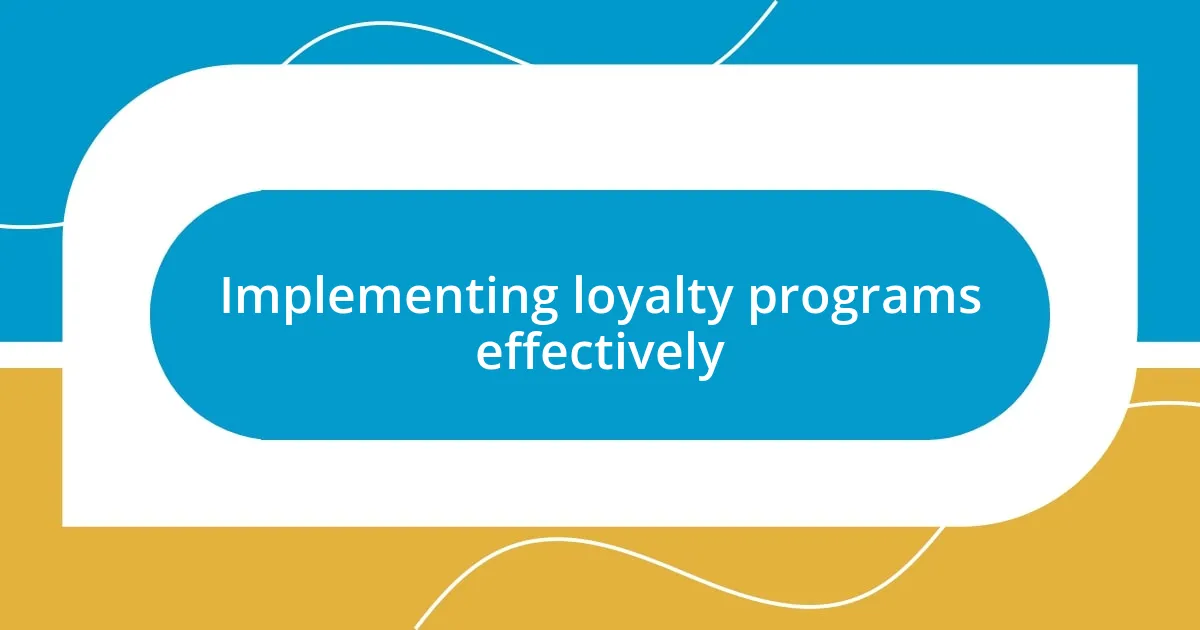
Implementing loyalty programs effectively
Implementing a loyalty program effectively requires an understanding of what truly resonates with your customers. I recall a restaurant I adore that rolled out a points-based loyalty system. Each time I visited, my server would hand me a card that tracked my points, and after a certain number, I could redeem a free dessert. It transformed my dining experience, knowing that each visit brought me closer to a little reward. Have you ever felt that small thrill when you know your loyalty is going to pay off?
Another effective strategy is tiered rewards, which I experienced with an online retailer I frequently shop at. As I progressed through their loyalty tiers, I gained access to exclusive offers and early product launches. It made me feel special, as if my commitment was acknowledged and valued. Isn’t it amazing how a little more recognition can encourage you to stay loyal to a brand?
Finally, integrating personalized offers can make a world of difference. I recently received a birthday discount from my favorite clothing store, and it felt like they genuinely remembered me. It’s those little touches, like however small they might seem, that amplify the emotional connection I have with the brand. Have you ever received a personalized note or discount that made you think, “Wow, they truly care?” Those moments can cement loyalty in ways that traditional marketing never could.
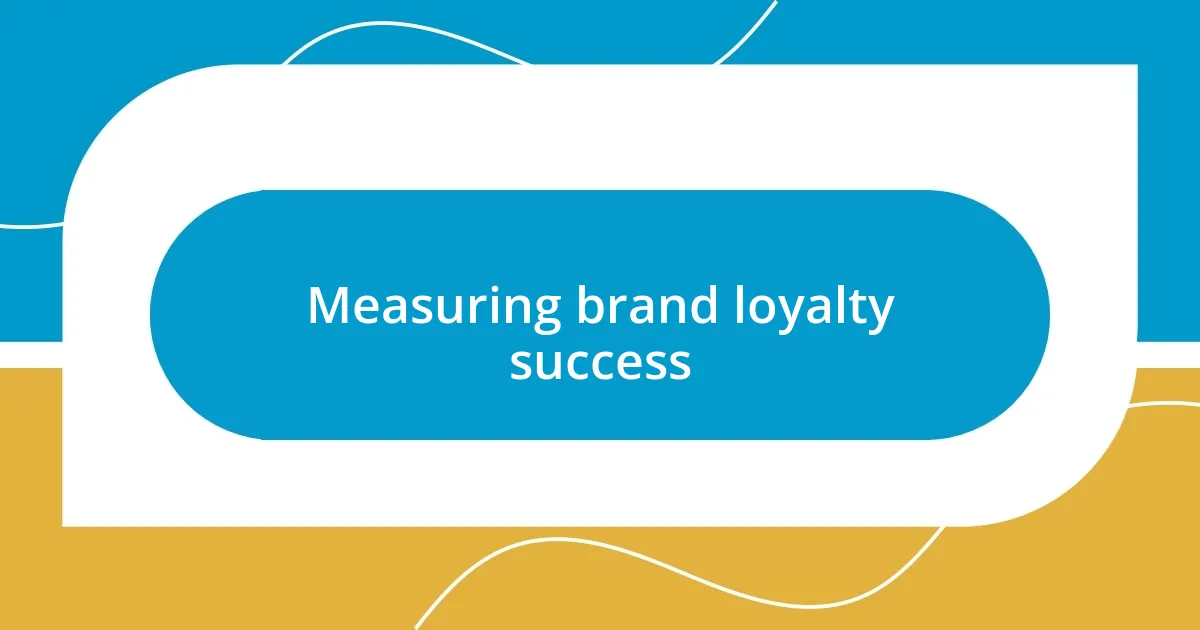
Measuring brand loyalty success
Measuring brand loyalty success can be fascinating, as it reflects not just numbers but emotions too. I remember when I first started monitoring customer retention rates for my own venture. Unexpectedly, I found that a simple survey at checkout asking customers about their experience provided invaluable insights. Their feedback made me realize that loyal customers weren’t just satisfied—they were enthusiastic advocates for my brand. Have you ever considered how a small gesture like seeking feedback could reveal the depth of connection you have with your audience?
Another key metric I’ve found essential is the Net Promoter Score (NPS). This tool gauges customer willingness to recommend your brand, and it opened my eyes to an intriguing pattern. After a particular campaign aimed at enhancing customer engagement, I noticed a significant uptick in my NPS. It was rewarding to see hard data backing the idea that loyalty isn’t just built on transactions; it’s about fostering genuine relationships. How often do we overlook the importance of word-of-mouth in measuring success?
Lastly, examining repeat purchase behavior can tell you a lot about brand loyalty. I tracked my own buying habits with a favorite coffee shop and was surprised to see how often I would return for the same seasonal drink. The emotional lift I felt every time I sipped that particular brew was undeniable. It made me ponder: isn’t it fascinating how a consistent, enjoyable experience can make a customer return time and again? By analyzing these patterns, brands can pinpoint what truly keeps customers coming back, and that, in my experience, is the heart of brand loyalty.












